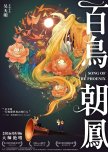This soft, poetic film by Wu Tianming went through so many hurdles getting itself into Chinese theaters when it came out, which in itself is indicative of the decline of post-2010's Chinese cinema.
There is nothing extraordinary or particularly phenomenal about "Song of the Phoenix," yet it possesses a distinctly Chinese spirit, reminiscent of Zhang Yimou's 1984 film, "Yellow Earth." This kind of film is incredibly rare in China nowadays, where directors are more interested in creating the next Michael Bay-wannabe movie, imitating Korean/HK films, or shoving idols and "fresh meat" actors who can't act but are popular and hence rake in cash into films that are shallow and soulless.
The journey of the suona in this film from a highly coveted instrument to one that is abandoned lead me to believe that Wu Tianming meant this as a message to both filmmakers and audiences in China alike. It also criticises Chinese society's obsession with brands, looks, and inability to patiently sit down to take in a reflective story with depth. It compels Chinese audiences to reflect why they have abandoned their culture for Western materialism. I see this issue in the Chinese TV industry as well these days: Grand productions with budgets of billions of dollars used to support dramas that offer very little story, or ones that recycle the same reused plots over and over again. Many veterans of the Chinese entertainment industry have stood up in recent years to criticise the demise of Chinese entertainment, but to no avail.
It takes an intimate understanding of the ways in which China has changed in the last 20 years to truly feel the depth of this film's messages, but I believe that all viewers regardless of culture will be able to connect to the weary despair the suona embodies. Ultimately, "Song of the Phoenix" is not a technically special film, but it provides excellent commentary on the rapid decline of Chinese culture within China. I truly wish that filmmakers, TV producers, and screenwriters in China would take a page from Wu Tianming's book in the way they approach their future storytelling. Unfortunately, I feel that given how money and surface grandiosity are what is "in" these days, it will probably not happen. Which, consequently, is what makes the last scene in this film that much more sorrowful.
There is nothing extraordinary or particularly phenomenal about "Song of the Phoenix," yet it possesses a distinctly Chinese spirit, reminiscent of Zhang Yimou's 1984 film, "Yellow Earth." This kind of film is incredibly rare in China nowadays, where directors are more interested in creating the next Michael Bay-wannabe movie, imitating Korean/HK films, or shoving idols and "fresh meat" actors who can't act but are popular and hence rake in cash into films that are shallow and soulless.
The journey of the suona in this film from a highly coveted instrument to one that is abandoned lead me to believe that Wu Tianming meant this as a message to both filmmakers and audiences in China alike. It also criticises Chinese society's obsession with brands, looks, and inability to patiently sit down to take in a reflective story with depth. It compels Chinese audiences to reflect why they have abandoned their culture for Western materialism. I see this issue in the Chinese TV industry as well these days: Grand productions with budgets of billions of dollars used to support dramas that offer very little story, or ones that recycle the same reused plots over and over again. Many veterans of the Chinese entertainment industry have stood up in recent years to criticise the demise of Chinese entertainment, but to no avail.
It takes an intimate understanding of the ways in which China has changed in the last 20 years to truly feel the depth of this film's messages, but I believe that all viewers regardless of culture will be able to connect to the weary despair the suona embodies. Ultimately, "Song of the Phoenix" is not a technically special film, but it provides excellent commentary on the rapid decline of Chinese culture within China. I truly wish that filmmakers, TV producers, and screenwriters in China would take a page from Wu Tianming's book in the way they approach their future storytelling. Unfortunately, I feel that given how money and surface grandiosity are what is "in" these days, it will probably not happen. Which, consequently, is what makes the last scene in this film that much more sorrowful.
Cet avis était-il utile?





















